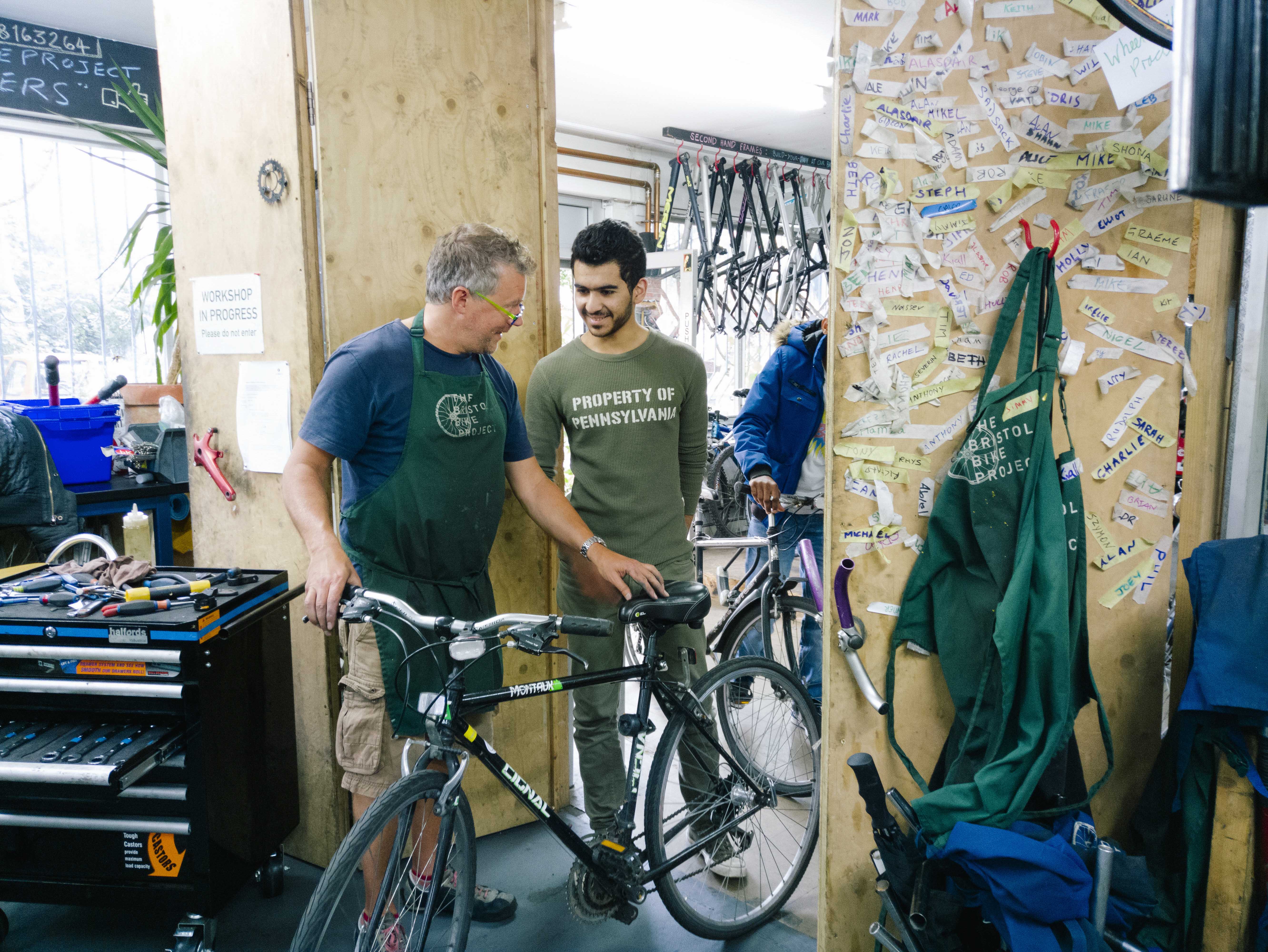The Bristol Bike Project is transforming lives with the power of two wheels
- Text by James Arthur Allen
- Photography by James Arthur Allen

Stokes Croft, in the city of Bristol, has long been a hotbed of creativity and activism: a microcosm that retains its independent roots even in a time of increased gentrification and development.
Nestled under the Banksy-adorned Hamilton House, an otherwise standard five-storey office block, lies the Bristol Bike Project (BBP), a workshop-cum-bike shop that sells second-hand steeds and offers maintenance courses.
But BBP is no ordinary bike pitstop: people who walk through these doors never really leave.


Founded in 2008 by James Lucas and Colin Fan, the project has grown into a full-time enterprise that supports and equips vulnerable groups in the local community through the humble bicycle.
At the core of the project is their Earn-a-Bike programme, set up so that people from all walks of life – from asylum seekers and at-risk youth, to anyone living on the margins – can learn basic mechanics and earn a bicycle in the process: there are no hand-outs here.
BBP operates as a not-for-profit workers’ co-operative with a flat structure of pay. “All profits are channelled back into our volunteer-run programme,” says James, who also founded Boneshaker magazine as an outlet for his two-wheeled passion.
“The programme is inspired by the Chinese proverb: ‘Tell me and I’ll forget. Show me and I may remember. Involve me and I’ll understand.’”

Co-founder James Lucas has long believed in the transformative power of bikes.
This philosophy leads to a hustle and bustle that doesn’t limit itself to staff. On a sunny day in early June, Julien and Big Al – both experienced bike mechanics – are running the Fix-a-Bike session, overseeing volunteers at six busy work stations.
Customers, volunteers and users of the project rub shoulders as they work alongside one another, talking bikes and life, exchanging skills and advice, and generally having a laugh.


There’s something infectious about the spirit of the place. As a photographer, it’s my job to capture that. But gaining the trust of your subjects is always a brand new challenge.
I’m used to turning up to shoots with a huge camera bag in hand, rolls of film and sturdy light metre. But there’s something distinctly freeing about simply shooting on a phone like the Kodak Ektra. Without a huge camera in my face, conversations flowed more freely.


One work-station down, 22-year-old Salah from Eritrea is tinkering with a chain. He wipes the grease from his hands.
“The Bike Project allows me to get to school using my bike and it is a positive way to spend my time,” he says. “I can also practice my English here; this is very important.”

I’m used to covering stories of social change around the world in places like Turkey and most recently Israel. These stories have taught me many things about people and how resilient and kind they can be.
But what I didn’t expect was to find a such a depth of stories so close to home. It seems that some of the most remarkable stories are being played out right under our noses.

Over the course of the afternoon, around 30 people pass through the doors to work on and repair bikes. The project isn’t just about fixing bikes; it’s about fixing the gaps that exist in society and involving everyone in an equal way.
Pivot Points: Stories of Change from Huck Photographers are shot entirely on the Kodak Ektra, a 21 megapixel camera smartphone with 4K video capability.
Enjoyed this article? Like Huck on Facebook or follow us on Twitter.
Latest on Huck

Bernie Sanders introduces Clairo at Coachella, urging young Americans to “stand up for justice”
Coachella charmed — The Vermont Senator praised the singer-songwriter for her efforts in raising awareness of women’s rights issues and Gaza.
Written by: Isaac Muk

The Changing Face Of Brooklyn, New York’s Most Colourful Borough
After three decades spent capturing stories around the world, Magnum Photographer Alex Webb finally decided to return home to Brooklyn – a place that champions chaos, diversity and community spirit.
Written by: Alex Webb / Magnum Photos

The mundane bliss of New York’s subways in the ’70s
NYC Passengers 1976-1981 — During a very different decade in NYC, which bounced between rich creativity and sketchiness, photographer Joni Sternbach captured the idiosyncratic isolation found on its rail networks.
Written by: Miss Rosen

Analogue Appreciation: lullahush
Ithaca — In an ever more digital, online world, we ask our favourite artists about their most cherished pieces of physical culture. Today, it’s Irish retro-futurist lullahush.
Written by: lullahush

Spyros Rennt captures connection and tenderness among Berlin’s queer youth
Intertwined — In the Greek photographer’s fourth photobook, he lays out spreads of togetherness among his friends and the German capital’s LGBTQ+ party scene.
Written by: Isaac Muk

The rebellious roots of Cornwall’s surfing scene
100 years of waveriding — Despite past attempts to ban the sport from beaches, surfers have remained as integral, conservationist presences in England’s southwestern tip. A new exhibition in Falmouth traces its long history in the area.
Written by: Ella Glossop